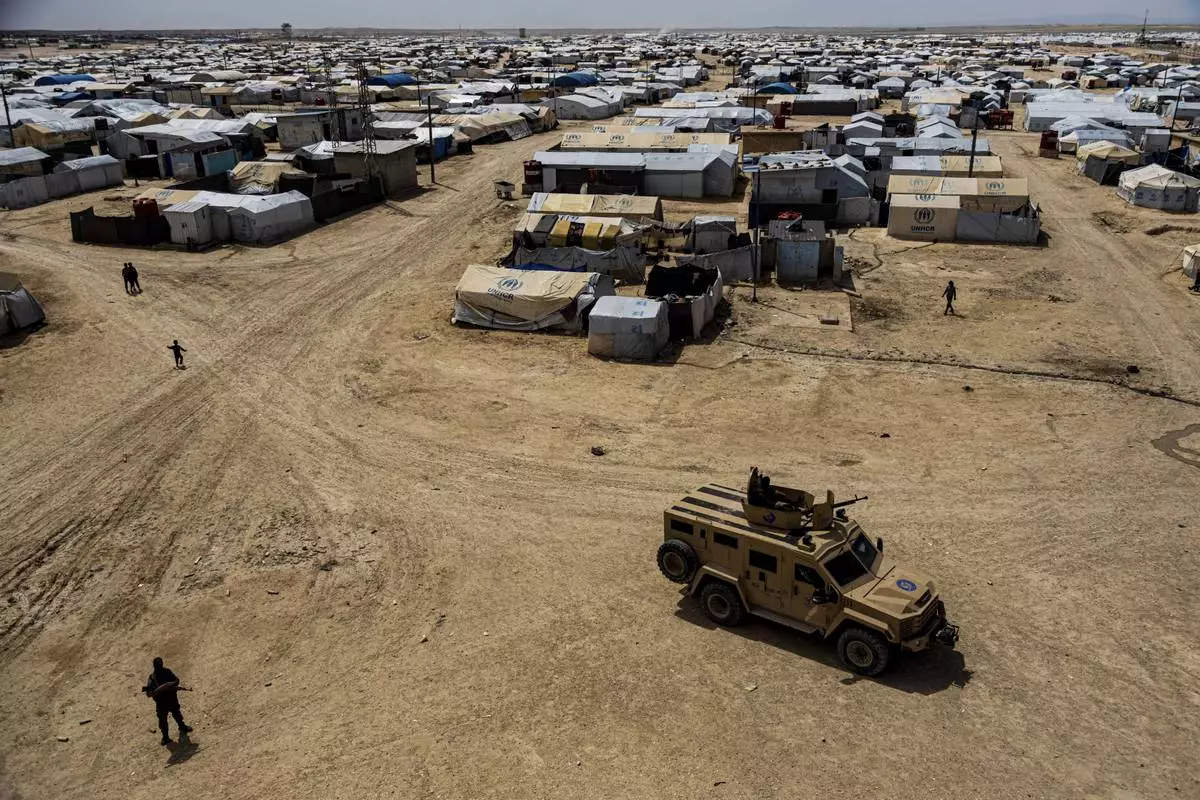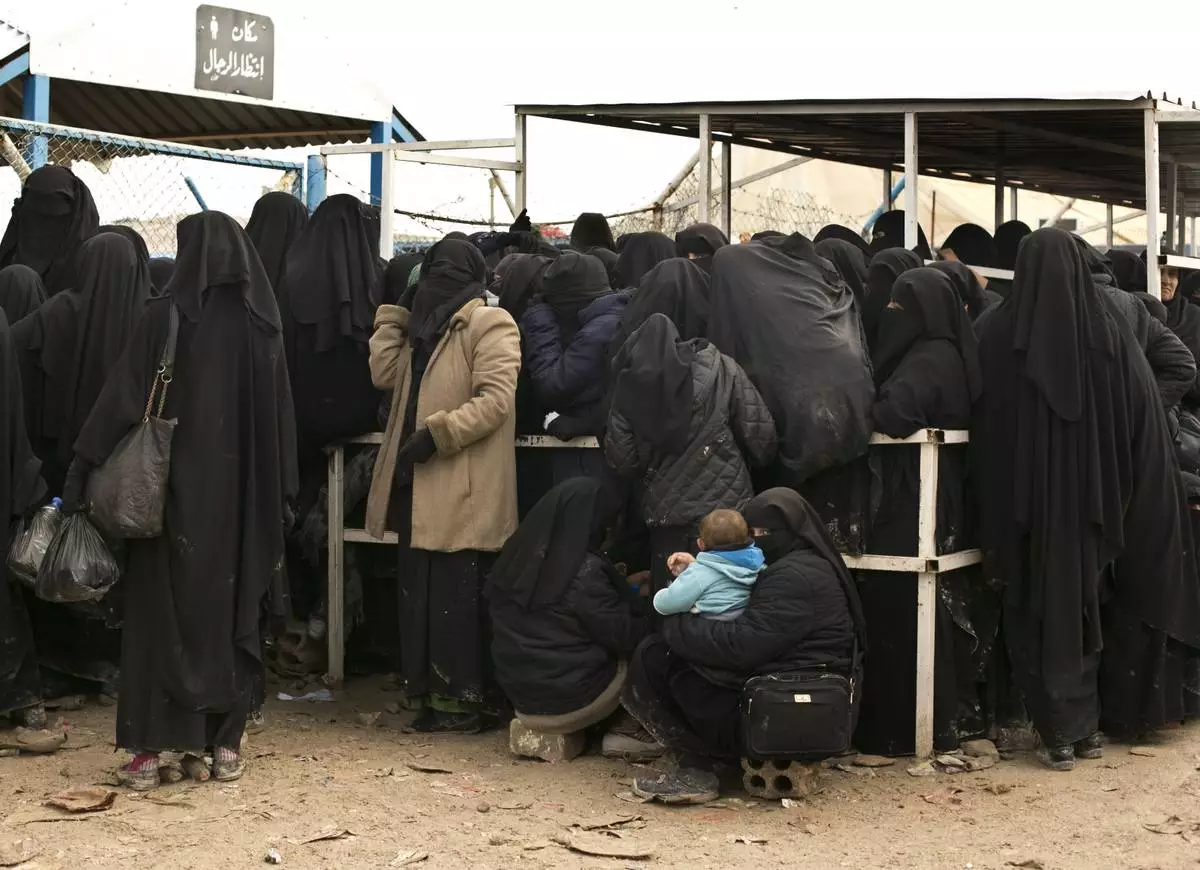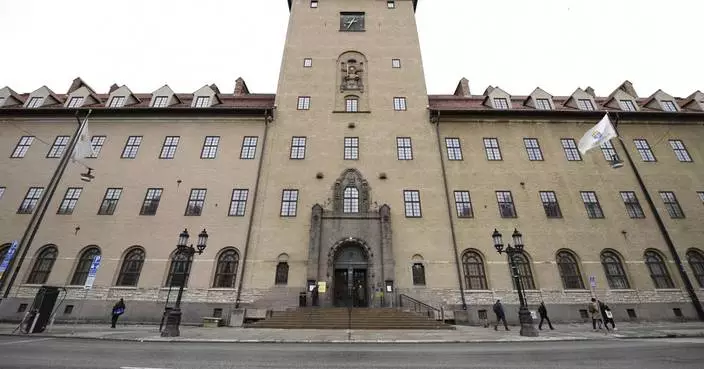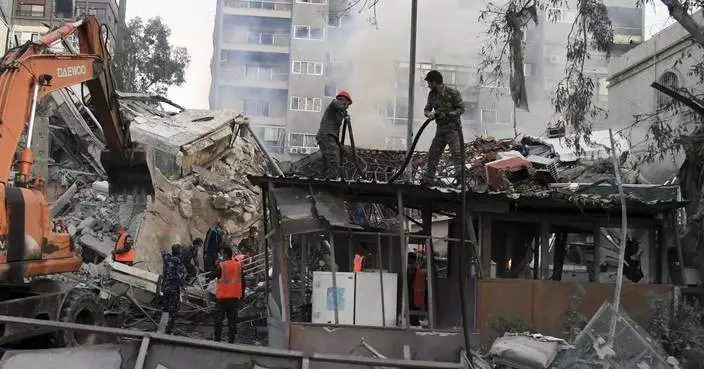Turkish military forces captured 18 Syrian government soldiers in northeastern Syria, Turkey's defense minister said Thursday, in one of the most dramatic examples of an increasingly muddled battleground following the withdrawal of U.S. forces from the area.
Turkish Defense Minister Hulusi Akar said the soldiers were captured during Turkish reconnaissance operations southeast of Ras al-Ayn but didn't say when. Ankara was already in talks with Russia to hand over the Syrian soldiers, he added. Akar spoke during a visit to Turkish troops at the border with Syria. His comments were carried on the official ministry website.
A Syrian Kurdish official said the soldiers were captured Tuesday during an intense battle between Syrian government forces and Turkey-backed fighters. Kurdish fighters were fighting alongside the Syrian troops. The official spoke on condition of anonymity because he was not authorized to brief reporters.
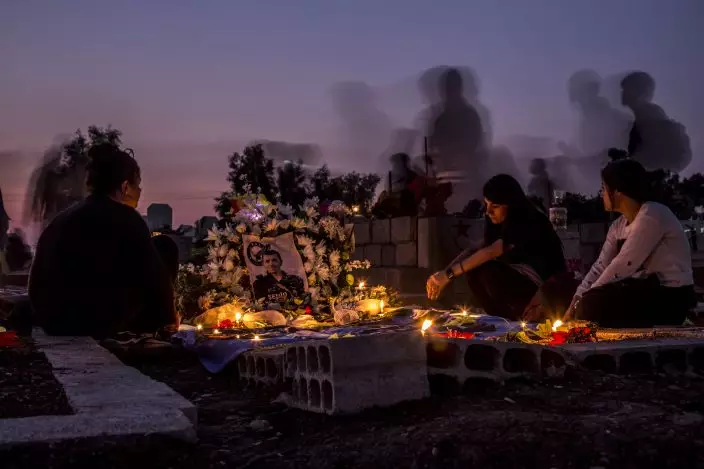
Relatives visit a grave of Syrian Democratic Forces fighter recently killed during Turkish offensive, in the town of Qamishli, north Syria, Thursday, Oct. 31, 2019. (AP PhotoBaderkhan Ahmad)
Turkey agreed to a cease-fire brokered by Russia in which Kurdish fighters would withdraw 30 kilometers (19 miles) away from the Turkish border. As part of the deal, Syrian government forces would take positions along the frontier.
In a wide-ranging interview late Thursday, Syrian President Bashar Assad described the Russian-Turkish deal as "good" and a temporary arrangement. He said with the deal Moscow has managed to reign in Turkish aspirations to seize more Syrian lands and outmaneuvered Washington. The deal also prevented bringing in international forces to Syria's northeast.
"It does not achieve everything, in the sense that it will not pressure the Turks to leave immediately," Assad said. "However, it limits the damage and paves the way for the liberation of this region in the future, or the immediate future, as we hope."
Assad said Russia also preceded the cease-fire deal with Turkey with an agreement with Syria's Kurdish group that gradually restores state authority to the area after seven years. Syrian troops had pulled out of the northeast in 2012, leaving it to the Kurdish group to administer. The Kurdish group had then allied with U.S. forces to fight Islamic State militants — and set up a self-administration that controls nearly 30 percent of Syria, including the country's largest oil and gas resources.
Earlier this month, U.S. President Donald Trump ordered US troop withdrawal from the north, making way for a Turkish military offensive there. He said he wanted out of America's "endless wars" but would leave U.S. troops in the region to secure oil facilities.
Ankara views the Syrian Kurdish fighters as an extension of the decades-long Kurdish insurgency in southeastern Turkey. But Washington has partnered with those Kurdish-led forces to fight IS over the last five years, putting in a difficult spot between its NATO ally and battleground partners.
The Kurdish forces leaned on Russia and the Syrian government to protect them against the advancing Turkish forces. But Turkey seized a stretch of land across the border before the U.S. negotiated an initial cease-fire.
"Of course, the Syrian Army cannot be deployed only to carry out purely security or military acts," Assad said. "But certainly, the Syrian Arab Army will reach these areas simultaneously with full public services, which means the return of full state authority. "
Assad said state authority would have to be restored gradually because there are armed groups that still have to be disarmed.
"We do not expect them to hand their weapons immediately," Assad said. A day earlier, the Syrian government called on the Kurdish groups to join the official military. But the Kurdish group, which is seeking a degree of self-rule, said there has to be a dialogue with Damascus first.
In another sign of the changing battleground, U.S. forces said the first batch of mechanized armored vehicles arrived in southeast Syria on Thursday, where they are to take part in securing oil fields and fighting remnants of the Islamic State group. U.S.-led Coalition spokesman Col. Myles Caggins said the first batch of Bradley armored infantry carriers arrived in Deir el-Zour Province and will provide infantry with maneuverability and firepower. He said the deployment is "de-conflicted" with other forces operating in the region.
The province is home to some of Syria's largest oil fields. It is also where IS militants continue to wage an insurgency and where they lost their last territory in March.
Assad said his forces would not clash with U.S. forces, if the Kurdish group united with the state against American presence, "I assure you that the Americans will leave on their own accord."
For much of the Syrian war that broke out in 2011, Turkey has offered financial and logistical backing for the Syrian opposition that worked to bring Assad's government down. Ankara has also carried out three military operations into Syria and now controls territory in northwest and northeast Syria to push Islamic State militants and Kurdish fighters away from its borders.
Under the Turkey-Russia deal, Kurdish fighters would withdraw to 30 kilometers (19 miles) away from the Turkish border. Under the deal, Syrian government forces would take positions along the frontier and joint Turkish-Russian patrols are due to begin Friday.
But the truce has been marred by accusation of violations from both sides.
For days now, Turkey-allied fighters have been fighting Kurdish forces near Abu Rasein, a village between Ras al-Ayn and Tal Tamr, despite the deployment of Syrian government forces. Syrian state media also reported some government soldiers clashed with the Turkey-backed forces.
The Kurdish official said the Syrian government soldiers were captured in the area. He said the forces then withdrew after their soldiers were captured.
A war monitor group, the Syrian Observatory for Human Rights, also reported that Syrian troops pulled out from the Tal Tamr area on Wednesday, amid a Turkish-backed advance with air cover. The area is home to Syria's dwindling Christian Assyrian community. The commander of the Kurdish-led Syrian Democratic Forces, Mazloum Abdi, warned that Turkey-backed fighters began entering Christian villages and are attempting to break into the main town.



